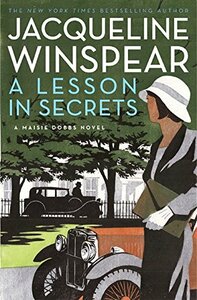Take a photo of a barcode or cover
This one was boring and didn’t really seem plausible but liked the descriptions of college life
Probably my least favorite of my recent Maisie Dobbs mysteries. I felt the book had too many story lines--lines that distracted from the main plot rather than added to it. Also, I felt that Maisie was rather passive in this book. Being acted upon rather than doing the acting.
adventurous
mysterious
medium-paced
Plot or Character Driven:
Plot
Strong character development:
Yes
Loveable characters:
Yes
Diverse cast of characters:
No
I really enjoy the narrator for the audio - though her accent when she does American characters is a bit exaggerated. The topic of fascism and who is drawn to it and why feels timely.
emotional
mysterious
reflective
medium-paced
Plot or Character Driven:
Plot
Strong character development:
No
Loveable characters:
Yes
Diverse cast of characters:
Complicated
Flaws of characters a main focus:
No
I nearly stopped reading this book, as the beginning was rather slow. Combine this with Maisie Dobbs being rather different from the books prior and it was a rough start. I’m thrilled that I continued on with it however, as the book progressed nicely after chapter three and I found the twists and turns satisfying, albeit some are potentially pointless unless brought up in future books.
A wonderful read that delivered on its promises in a manner that some may guess and others will not, though I could not bring myself to give it a higher score due to the beginning. I will be getting the next in the series to continue on.
A wonderful read that delivered on its promises in a manner that some may guess and others will not, though I could not bring myself to give it a higher score due to the beginning. I will be getting the next in the series to continue on.
I liked this one a lot. The mounting tension in Germany at the time lends excellent backdrop to the weird goings-on at the college, and I liked that Maisie could walk in Maurice's footsteps as a teacher.
As with the more recent titles, this is not as dense as the earliest books in the series. I can see where the ominiscient Maisie in regard to the coming of WWII will start to grate. I also continue to be irritated by the author's getting titles of nobility wrong. Couldn't she have fixed that by now? Why perpetuate errors?
I dropped this down to a three because after the awesome of last book this wasn't as strong. The mystery was so so, the side story with British Intelligence was mostly to set up the next book, I think. Also there was this weird side story with James Compton that kinda went no where.
I don't know it was the relevance to our current political landscape or the fact that this book saw several characters moving forward, but for me this was definitely a high point in the series.
This eighth entry in the Maisie Dobbs series was a bit slow getting started and there were parts of it that didn't ring true for me, that seemed a bit "off" - I'm not quite sure how else to explain it - so, on the whole, I can't say it is one of my favorites. Still, it wasn't a stinker. It just wasn't as entertaining as some.
This book actually marks a bit of a turning point in the series. Up until now, the focus has been on the events of World War I and the years following that war. Now, we have arrived at the 1930s and Maisie herself is in her 30s and is a successful businesswoman. There is unrest in Germany. The Nazis and their leader Adolf Hitler are near to being able to take over the country and the philosophy espoused by Hitler is finding adherents in other countries as well. Including England.
In the beginning, Maisie finds herself being followed and determines that it is the police doing the following. Why? Well, she soon has her answer. The Special Branch wants to recruit her for intelligence work and the surveillance is a kind of test to see how observant she is.
Dobbs eventually meets with the government's representatives and they explain what they want her to do. They want her to go undercover as an instructor at a college established by a well-known pacifist. The goal of the college is to bring young people from different countries and backgrounds together to encourage dialogue and to foment peace in the world. However, the intelligence service suspects that there may be something more going on at the college, something that may be a threat to the Crown.
Maisie accepts the assignment and becomes a lecturer in philosophy at the college and soon learns that there are stresses and strains in the relationships among the staff there. She also finds that there are admirers of Hitler present at the college.
Meantime, back at her other business, her assistant Billy is carrying the load. That includes investigating the supposedly accidental death of the husband of Sandra, a friend and associate from Maisie's past. Billy is stressed because his wife is expecting their fourth child, after the death of the third child about a year before, and he and his family are living in a slum and he needs to get them into healthier living quarters. And here's one of my quibbles with these books. Maisie is condescending toward her assistant. She often treats him like he's not very smart, although he gives every evidence of being quite bright and street-smart, as well as a very responsible husband and father. He deserves better from her.
Maisie's investigation at the college proceeds more or less smoothly. Then, the head of the college is unexpectedly murdered. Is this related somehow to the matters that Maisie is investigating?
The plot of this novel was kind of all over the place and included a line regarding Maisie's romantic relationships. She is having an affair with James Compton, the son of the family that she worked for as a maid when she was a teenager. Meantime, a colleague from the police with whom she works, Richard Stratton, also carries a torch for her and, to this reader at least, seems a much better match for Maisie. Frankly, I find the Compton relationship a bit unbelievable.
Still another strand of the plot involves Maisie's aging father, who now seems to have his own romantic involvement, Maisie tends to try to order her father's life as well. She's actually a busybody in the lives of people she cares about. Her attitude is she knows best what is good for them, regardless of their opinions in the matter.
Overall, I didn't really feel engaged by the plot of this book. It was too muddled for my taste. But I do care about the main characters and so I kept reading to see where it was going. In the end, I didn't feel that the story moved any of the characters that much forward, but at least now we have arrived beyond the immediate post-World War I period. Interesting times are ahead. I wonder what Winspear will do with them.
This book actually marks a bit of a turning point in the series. Up until now, the focus has been on the events of World War I and the years following that war. Now, we have arrived at the 1930s and Maisie herself is in her 30s and is a successful businesswoman. There is unrest in Germany. The Nazis and their leader Adolf Hitler are near to being able to take over the country and the philosophy espoused by Hitler is finding adherents in other countries as well. Including England.
In the beginning, Maisie finds herself being followed and determines that it is the police doing the following. Why? Well, she soon has her answer. The Special Branch wants to recruit her for intelligence work and the surveillance is a kind of test to see how observant she is.
Dobbs eventually meets with the government's representatives and they explain what they want her to do. They want her to go undercover as an instructor at a college established by a well-known pacifist. The goal of the college is to bring young people from different countries and backgrounds together to encourage dialogue and to foment peace in the world. However, the intelligence service suspects that there may be something more going on at the college, something that may be a threat to the Crown.
Maisie accepts the assignment and becomes a lecturer in philosophy at the college and soon learns that there are stresses and strains in the relationships among the staff there. She also finds that there are admirers of Hitler present at the college.
Meantime, back at her other business, her assistant Billy is carrying the load. That includes investigating the supposedly accidental death of the husband of Sandra, a friend and associate from Maisie's past. Billy is stressed because his wife is expecting their fourth child, after the death of the third child about a year before, and he and his family are living in a slum and he needs to get them into healthier living quarters. And here's one of my quibbles with these books. Maisie is condescending toward her assistant. She often treats him like he's not very smart, although he gives every evidence of being quite bright and street-smart, as well as a very responsible husband and father. He deserves better from her.
Maisie's investigation at the college proceeds more or less smoothly. Then, the head of the college is unexpectedly murdered. Is this related somehow to the matters that Maisie is investigating?
The plot of this novel was kind of all over the place and included a line regarding Maisie's romantic relationships. She is having an affair with James Compton, the son of the family that she worked for as a maid when she was a teenager. Meantime, a colleague from the police with whom she works, Richard Stratton, also carries a torch for her and, to this reader at least, seems a much better match for Maisie. Frankly, I find the Compton relationship a bit unbelievable.
Still another strand of the plot involves Maisie's aging father, who now seems to have his own romantic involvement, Maisie tends to try to order her father's life as well. She's actually a busybody in the lives of people she cares about. Her attitude is she knows best what is good for them, regardless of their opinions in the matter.
Overall, I didn't really feel engaged by the plot of this book. It was too muddled for my taste. But I do care about the main characters and so I kept reading to see where it was going. In the end, I didn't feel that the story moved any of the characters that much forward, but at least now we have arrived beyond the immediate post-World War I period. Interesting times are ahead. I wonder what Winspear will do with them.



